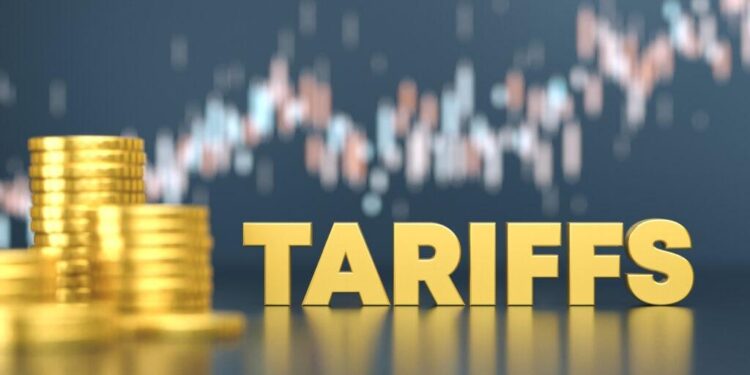Germany faces mounting economic pressure as escalating tariffs and soaring energy costs threaten to destabilize its industrial backbone. With crude oil prices climbing steadily, the key European economy is confronting a perfect storm that could ripple across global markets. This article examines how the intersection of trade tensions and energy inflation is raising alarm bells for Germany’s economic future, shedding light on the latest developments in the crude oil market that could deepen the crisis.
Tariffs Amplify Pressure on Germany’s Manufacturing Sector Amid Rising Energy Costs
The German manufacturing sector is facing mounting challenges as tariffs on imported goods coincide with soaring energy expenses, creating a perfect storm that threatens industrial output and competitiveness. As crude oil prices surge, energy-intensive industries such as steel production, chemical manufacturing, and machinery are confronting unprecedented cost pressures. These rising operational expenses are forcing manufacturers to reassess supply chains, push up product prices, and in some cases, delay investments crucial for long-term growth. Experts warn that without immediate policy intervention, the ripple effects could lead to job losses and a downturn in one of Europe’s economic powerhouses.
Key factors influencing the sector’s vulnerability include:
- Increased tariffs: Import duties on raw materials and intermediate goods have risen by up to 15%, inflating production costs.
- Energy cost inflation: Electricity and gas prices have doubled in the past year, directly impacting profitability.
- Supply chain disruptions: Extended delays and higher freight charges exacerbate inventory management challenges.
| Sector | Tariff Increase (%) | Energy Cost Rise (%) | Projected Output Impact |
|---|---|---|---|
| Steel | 15 | 50 | Decrease by 8% |
| Chemicals | 12 | 45 | Decrease by 6% |
| Machinery | 10 | 40 | Decrease by 5% |
Surging Crude Oil Prices Drive Inflation and Threaten Economic Stability
The sustained upward trajectory of crude oil prices is exerting considerable pressure on Germany’s economic framework. Energy-intensive industries, from manufacturing to logistics, are facing skyrocketing operational expenses that are rapidly squeezing profit margins. Inflation rates have surged as higher fuel and transportation costs push consumer prices upward, eroding household purchasing power and dampening consumer confidence. The ripple effects are especially pronounced given Germany’s reliance on imported energy, which has become increasingly expensive amid geopolitical tensions and supply chain disruptions.
Analysts warn that if these trends continue, the country could spiral toward a broader economic slowdown. Key factors exacerbating the situation include:
- Rising tariffs on energy imports that intensify cost pressures
- Volatility in the global crude oil market triggering unpredictable price hikes
- Reduced industrial output driven by energy cost constraints
- Potential job losses in energy-dependent sectors
| Indicator | Current Level | Impact |
|---|---|---|
| Crude Oil Price (USD/barrel) | $95 | High energy import costs |
| Inflation Rate (YoY %) | 7.5% | Decreased consumer spending power |
| Manufacturing Output | -3.2% | Slowdown due to cost constraints |
Policy Recommendations for Mitigating Energy Price Shocks and Supporting Industrial Recovery
To shield Germany’s industrial sector from volatile energy costs, policymakers must prioritize a multi-faceted approach that balances immediate relief with long-term resilience. First, implementing targeted subsidies for energy-intensive industries can help stabilize production costs without burdening taxpayers broadly. Additionally, fostering public-private partnerships to invest in renewable energy infrastructure will reduce dependence on imported fossil fuels, thereby mitigating exposure to global price shocks. Introducing flexible tariff structures that incentivize off-peak consumption could also alleviate grid stress and lower overall expenses for manufacturers.
Furthermore, enhancing transparency through real-time energy pricing dashboards will empower businesses to make informed operational decisions. Expanding access to low-interest loans aimed at upgrading energy efficiency technologies should be a priority to decrease the industrial sector’s carbon footprint and operational costs simultaneously. Below is a simplified overview of proposed policy tools and their expected impacts:
| Policy Tool | Short-Term Effect | Long-Term Benefit |
|---|---|---|
| Targeted Subsidies | Cost relief for key industries | Preserved industrial jobs |
| Flexible Tariffs | Lower peak electricity costs | Optimized energy consumption |
| Renewables Investment | Reduced fossil fuel import risk | Energy independence & decarbonization |
| Efficiency Loans | Stimulates tech upgrades | Lower operational expenses |
The Way Forward
As Germany grapples with rising tariffs and escalating energy costs, the potential for an economic crisis looms larger by the day. With crude oil prices continuing to fluctuate amid global uncertainties, the country’s industrial backbone faces mounting pressure that could ripple across Europe’s largest economy. Policymakers and industry leaders will need to navigate these challenges carefully to mitigate the risks and steer Germany away from economic turbulence. The coming months will be critical in determining whether timely interventions can stabilize the situation or if the nation will confront deeper financial strain ahead.
















